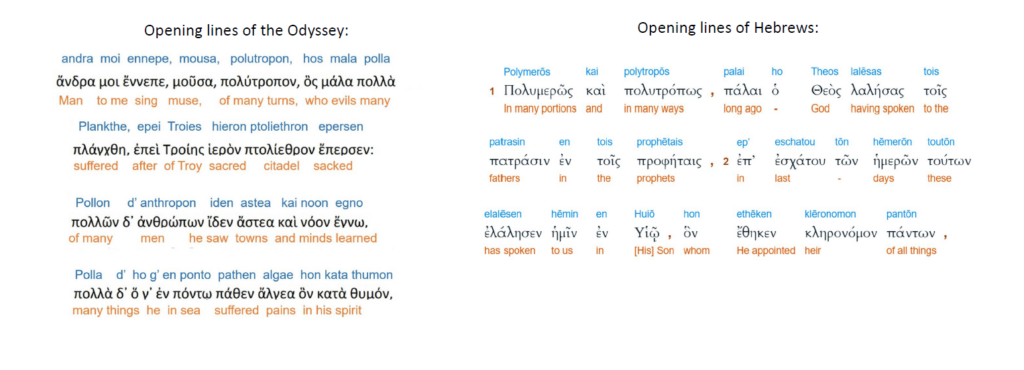A scene from The Canterbury Psalter (12th century)
Blog
Polytropos

Here’s a handout I use with undergrads who are reading Homer’s Odyssey at the beginning of the semester, and will read the book of Hebrews at the end. It just puts interlinear versions of the two books’ opening lines side by side, so we English-reading students can consider the coincidence that a neat word, polytropos, occurs early in both works. It really ties the semester together.
These word-for-word translations show the tension: Odysseus is a man of “many turns,” but God spoke to the Fathers “in many ways.” We would hardly want to confuse the wiliness of Odysseus with the biblical God’s providential guidance of salvation history. Same word, different works. But the word polytropos is worth lingering over, especially if you’ve got both books open in front of you.
A Homer commentary describes πολύτροπον as an “epithet of Odysseus” that occurs only here and in Odyssey 10. 330. But “it has many equivalents in Iliad and Odyssey, e. g. πολύμητις, πολύφρων, πολυμήχανος, ποικιλόμητις, the general sense of which seems to fix its meaning.” (Homer’s Odyssey. W. Walter Merry, James Riddell, D. B. Monro (Oxford. Clarendon Press, 1886-1901, online at Perseus).
The word also occurs in Homeric Hymn to Hermes. Yes, Hermes (a god but not the God) is wily, tricky, resourceful.
The poet emphasises the deceitful ways of Hermes at the outset of the hymn, in a string of epithets, “πολύτροπον, αἱμυλομήτην . . . νυκτὸς ὀπωπητῆρα, πυληδόκον” (13 f.). In the same language he sums up the god’s character at the end: “παῦρα μὲν οὖν ὀνίνησι κτλ.” (577 f.). The theft of the cattle of Apollo was the most striking myth which exemplified these knavish tricks; and the poet takes this to form the main thread of his narrative. (Thomas W. Allen, E. E. Sikes, Commentary on the Homeric Hymns, online at Perseus)
Hermenaughtiness goes way back.
The status of Odysseus’ polytropia becomes a debated issue in Plato’s dialogue Hippias Minor. This deserves close study, partly because it shows that the word itself is capable of many turns, and that Plato was already well aware of this. Highly stimulating! (David Corey has a paper on this that sidesteps Straussian motifs and sheds light on Socratic pedagogy.)
Still, no matter what sparks may be struck by knocking these two passages, epic and Bible, together, the safest and soberest resolution of the Homer-to-Hebrews journey of this complicated word (Emily Wilson allusion) is probably to consider that Liddell-Scott-Jones lists a much simpler meaning as one of the possibilities. In the LSJ entry below, the three main meanings are respectively I. Homer, II. Plato, and III. Hebrews:

One of the references under definition III is to Thucydides’ Peloponnesian War (2.44), in which, during his famous funeral oration, Pericles says of the Athenians fallen in battle, “their lives have been passed amid manifold vicissitudes;” that is, polytropic ups and downs, like all of us face. Various. Lotsa kinds. Many ways.
But in these last days, the (polymeric and) polytropic speech of God has been consummated in the Son, about whom we have much to say.
About This Blog

Fred Sanders is a theologian who tried to specialize in the doctrine of the Trinity, but found that everything in Christian life and thought is connected to the triune God.


